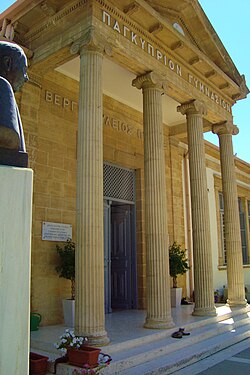Primary education

In the 2017-2018 academic year, there were 334 primary schools with 56,700 students and 3,980 teachers. [4] [5]
Education in Cyprus is overseen by the Ministry of Education, Sports and Youth. [1]
The education system is divided into pre-primary education (ages 3–6), primary education (ages 6–12), secondary education (ages 12–18) and higher education (ages 18+). [2] Full-time education is compulsory for all children aged between 5 and 15. [3] State-provided schooling including higher education is paid for by taxes.
There is also a parallel system of accredited independent schooling, and parents may choose to educate their children by any suitable means. Private school and university fees are not usually covered by the state.
Higher education often begins with a four-year bachelor's degree. Postgraduate degrees include master's degrees, either taught or by research, and the doctorate, a research degree that usually takes at least three years. Universities require accreditation by the Cyprus Agency of Quality Assurance and Accreditation in Higher Education in order to issue degrees.

In the 2017-2018 academic year, there were 334 primary schools with 56,700 students and 3,980 teachers. [4] [5]

Higher, or tertiary education is provided by a network of state and private universities and colleges. Private universities were first accredited in 2005 and require a special licence to operate and award degrees. This was set out in the 2005 Private Universities law. [6]
Currently the following universities have a licence by the Ministry of Education and Culture to issue academic degrees:

Technical and vocational training (TVET) addresses multiple demands of an economic, social and environmental nature by helping young people and adults to develop the skills they need for employment, decent work, and entrepreneurship, promoting equitable, inclusive and sustainable economic growth, and supporting transitions to green economies and environmental sustainability. [11]
The Human Resource Development Authority of Cyprus (HRDA) is the body in charge of managing training funds in Cyprus. The system relies on contributions paid by all employees, with the exception of the self-employed and government workers. By law the Human Resource Development Levy rate cannot exceed 1% of the emoluments paid to each employee. In practice, the levy rate is 0.5% of payroll, with a monthly cap of €4,533 (Regulation 509/2012). [11]
The HRDA issues grants to employers for approved training as well as allowances to trainees and financial assistance for obtaining training equipment. The HRDA subsidizes 80% of the cost of training, rising to 100% for ‘high-priority multi-company training programmes’. [11]
![]() This article incorporates text from a free content work.Licensed under CC BY-SA 3.0 IGO.Text taken from Funding skills development: the private sector contribution ,UNESCO,UNESCO. UNESCO.
This article incorporates text from a free content work.Licensed under CC BY-SA 3.0 IGO.Text taken from Funding skills development: the private sector contribution ,UNESCO,UNESCO. UNESCO.